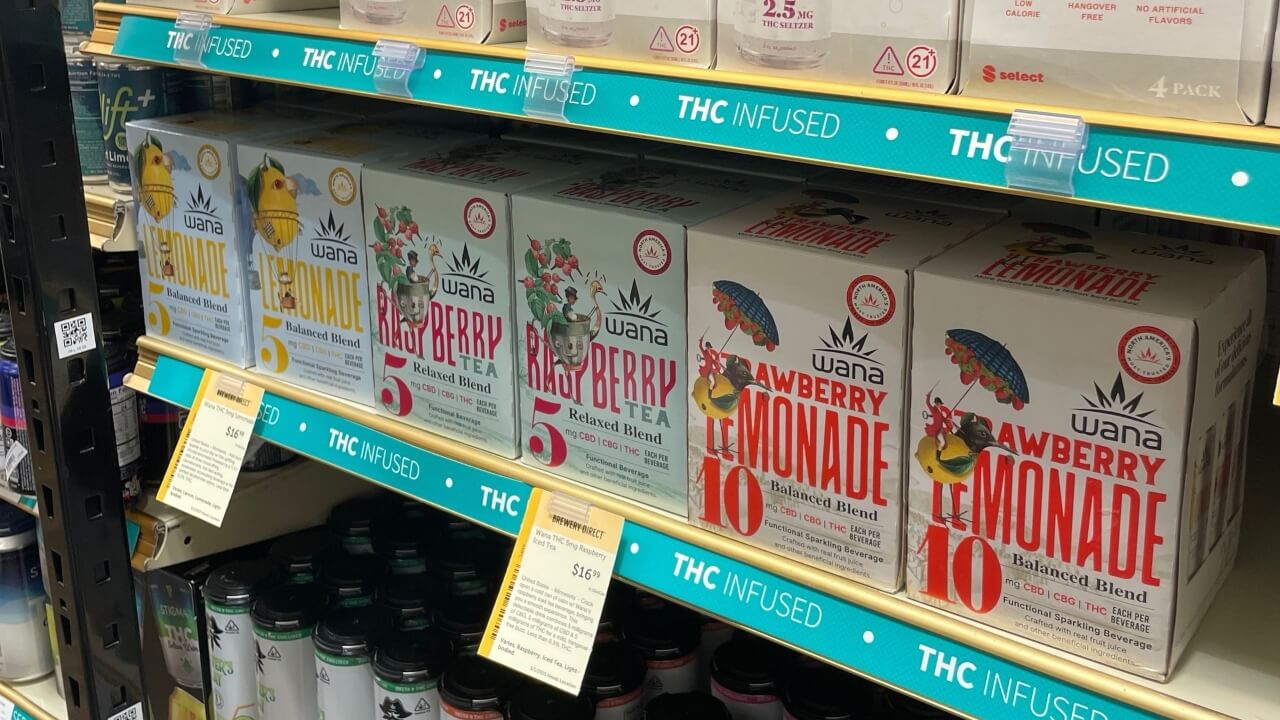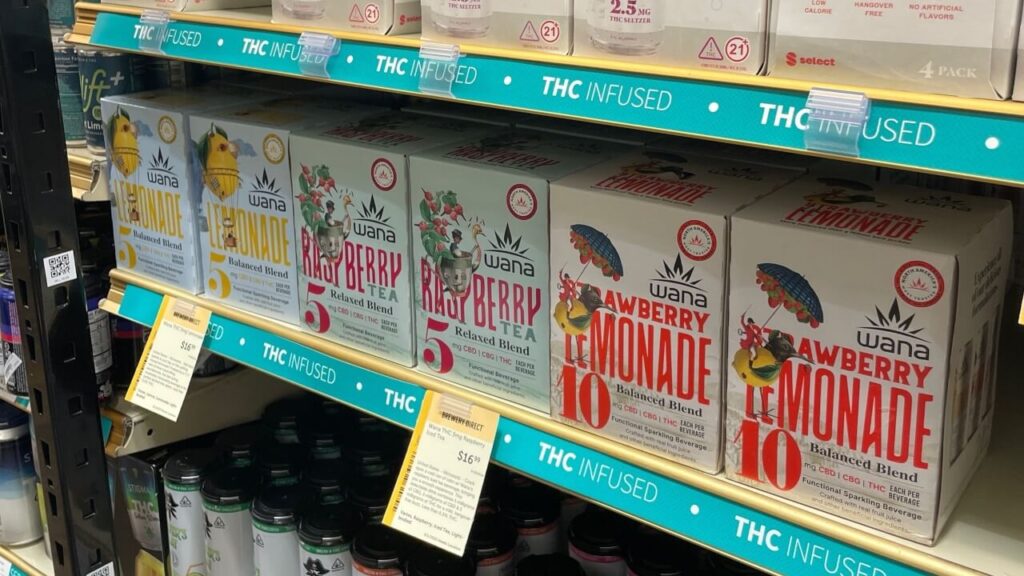This post was originally published on this site
Sponsored cannabis industry news from MJbizdaily.com

Another week, another move from an established company into the federally legal, hemp-derived THC market.
Organigram Global, one of Canada’s largest marijuana producers, announced April 1 that it was entering the growing delta-9 beverage segment through a multimillion-dollar deal for Collective Project, a THC drink manufacturer based in Hamilton, Ontario.
A day earlier, Curaleaf Holdings founder and CEO Boris Jordan touted the release of the company’s new energy drink, which combines 10 milligrams of hemp THC with 50 milligrams of caffeine.
The hemp-beverage market, fueled by shifts in consumer behavior and government allowances, is also drawing traditional retailers and conglomerates into the fold.
Recent entrants include San Francisco-based tech giant DoorDash and the parent of Edible Arrangements, a behemoth that generates about $500 million in annual sales from bouquet-shaped fruit baskets via its franchised stores and delivery service.
The intoxicating hemp-beverage boom, which originated in Minnesota in 2023, has expanded nationwide but primarily taken root in the Southeast and Texas and, more broadly, in states without regulated access to traditional marijuana products.
Minnesota, where recreational marijuana sales could launch sometime this year, is one of the few states that also regulates hemp-derived cannabinoid products.
Licensed marijuana operators and traditional retailers are initiating varying strategies to win over consumers while navigating production, warehousing and delivery challenges as more states enact restrictions and, in some cases, outright bans.
Mainstream crossing over to hemp-derived THC
Georgia-based Edible Brands, a subsidiary of Edible Arrangements, launched its e-commerce marketplace March 20 in Texas.
Edibles.com, which is expanding sales to the Carolinas, Florida and Georgia, had 31 hemp-derived THC products available at press time, including delta-9 beverages, gummies and drink enhancers.
Edibles Brands’ launch partners included:
- 1906
- Ayrloom
- Cann
- Cantrip
- Happi
- Wana Brands
Months of internal market research yielded data showing that consumers were primarily using THC and CBD products for sleep, pain management and relaxation, according to Thomas Winstanley, whom Edible Brands hired in July to build and launch the marketplace.
“We want to increase accessibility to health and wellness,” Winstanley told MJBizDaily in a phone interview.
When he moved to Georgia, the former chief marketing officer for Massachusetts-based cannabis brand Theory Wellness said he was shocked to see hemp-derived THC products lacking quality standards being sold at gas stations and other unregulated retailers.
Under Edible Brands’ etail model, shoppers must verify their age before the online transaction and at delivery, which is carried out by Edible Arrangements franchisees serving as third-party logistic hubs.
The company, which is planning to open a flagship retail store this summer in Atlanta as a prototype franchising model, is in negotiations to expand the concept to other markets, Winstanley said.
“We hope to democratize access to the brick-and-mortar success of this industry and do it at a fraction of the cost as the alternative in the cannabis industry would be,” he added.
“As we look at points of distribution and accessibility of products, we see retail as a significant accelerator to that future growth and future success.”
Tilray’s delta-9 THC beverage game plan
Canadian cannabis and alcohol company Tilray Brands entered the delta-9 THC beverage market in late 2024 with its Happy Flower brand of fruit daiquiris and Bellinis.
“In the U.S., our focus right now is primarily in the Southeast,” said Sam Garfinkel, Tilray’s senior vice president of commercial operations and strategy.
“That’s where a lot of the permissive language has been developed, and the categories are sort of exploding.”
Though forecasts are a murky business, London-based data analytics and research firm Euromonitor International projects sales of hemp-derived THC beverages to balloon to $4.1 billion by 2028, an astronomical 1,615% increase from $239 million in 2023.
Tilray, which has offices in Leamington, Ontario, Canada, and New York, relies on a team of food scientists, formulators and product developers to create beverage styles and flavor profiles while its supply chain of alcohol distributors handle delivery.
The conglomerate went on a brewery-buying spree between 2020 and 2023, acquiring at least a dozen craft-beer brands.
The deals included:
Cannabis companies adapting to consumer shifts
Tilray CEO Irwin Simon said during an April 2023 earnings call that the company built its American alcohol business to adapt to delays in U.S. marijuana reform, part of the reason it and others have moved into the hemp-derived THC space.
In its earnings report for its second quarter ended November 30, 2024, Tilray said sales of its alcohol beverage lines increased 36% year-over-year to $63 million, accounting for roughly 30% of its quarterly revenue of $211 million.
Despite the strong quarterly performance, Tilray executives are keenly aware alcohol consumption is decreasing across generations, particularly among Gen Zers.
“We think that the hemp-derived delta-9 beverages are a nice opportunity to give consumers a way to relax and unwind without consuming alcohol if they choose not to,” Garfinkel said.
Organigram provided a similar assessment for its Collective Project acquisition, which could a value of 30 million Canadian dollars ($20.9 million) if all revenue benchmarks are hit.
“In an environment where consumers are shifting away from alcohol, brands that deliver on an enjoyable experience without the negative effects of alcohol will be poised to win in this alternative beverage category that is growing at a rapid rate in the U.S.,” Organigram Chief Strategy Officer Paolo De Luca said in a statement.
‘More and more retailers coming on board’
Perhaps no newcomer has experienced a revenue spike like Brez’s: The West Palm Beach, Florida-headquartered beverage brand is on pace to hit a run rate of $50 million this year, according to CEO Aaron Nosbich.
The company, comprised of e-commerce and digital marketing experts, primarily ships its fast-acting hemp beverages directly to consumers.
About 25% of sales in compliant states are generated from 3,000 nationwide brick-and-mortar establishments, such as convenience stores, CBD outlets and liquor stores, including national chains Total Wine & More and Binny’s Beverage Depot.
Total Wine also has retail agreements with Curaleaf to carry its hemp-derived THC seltzers and with cannabis edibles maker Wana Brands to sell its hemp-derived THC-infused beverages at 100-plus outlets in nine markets.
“There’s more and more major retailers coming on board,” Nosbich said.
Brez makes its products in New York and ships them to five “legislatively friendly locations” for distribution.
Consumer demand is particularly strong in Florida, Georgia and Texas, according to Nosbich.
“I do think that states that do not have a medical cannabis or recreational cannabis program have more inherent demand for these products because they don’t have access,” he said.
The generational shift away from alcohol consumption has helped fuel consumer demand, including by the canna-curious.
“The fundamental desire here is that people want to feel good without feeling worse,” added Nosbich, who said he quit drinking alcohol in 2022 but missed the social aspects.
“We’re really hyperfocused on the experience and dialing that in.”
Navigating the changing regulations for hemp-derived products
Wana Brands in August 2024 launched Wanderous, an online marketplace for hemp-derived products, including the company’s first line of delta-9 sparkling beverages.
The Colorado-based company employs a hybrid distribution model, combining direct-to-consumer channels with strategic retail partnerships.
“The biggest surprise for us has been the speed at which consumers have adopted our beverage line and the enthusiasm around it,” Stephanie Daley, vice president of supply chain and operations, told MJBizDaily.
“It’s really taken off faster than we anticipated.”
Wana spends a lot of time and resources tracking legislative and regulatory developments in the dozen or so states it sells hemp-derived THC products.
In March, for instance, the Texas Senate advanced a bill that would levy a total ban on hemp-derived THC products.
The Texas House of Representatives has yet to address the bill, which would prohibit sales at more than 8,300 stores around the state, which is perhaps the epicenter of business in the segment.
Texas is one of a dozen or so states pursuing blanket bans or restrictions on intoxicating hemp products, threatening the multiyear boom, MJBizDaily recently reported.
“It feels like every other day there’s something new, regulatory wise that comes up that’s a hurdle,” Daley said.
Subscribe to the MJBiz Factbook
Exclusive industry data and analysis to help you make informed business decisions and avoid costly missteps. All the facts, none of the hype.
What you will get:
- Monthly and quarterly updates, with new data & insights
- Financial forecasts + capital investment trends
- State-by-state guide to regulations, taxes & market opportunities
- Annual survey of cannabis businesses
- Consumer insights
- And more!
Lack of new adult-use markets opens door hemp-derived products
California is a prime example.
The state’s Department of Public Health in March extended a temporary ban to at least June for any products with a detectable level of hemp-derived THC.
That followed an emergency regulation in September issued by Gov. Gavin Newsom and approved by the state’s Office of Administrative Law that critics contend eliminated 90%-95% of hemp retail products.
Wana was one of dozens of brands caught in the middle of expanding its hemp line in California before the order was enacted.
“We were planning to go into California on the retail side of things and had to, unfortunately, pause and cancel that entire plan,” Daley added.
The pivot came about two years after Wana wound down cannabis product sales in the state.
Meanwhile, the opportunities for adult-use marijuana legalization in the United States are shrinking, with Minnesota and possibly Pennsylvania the lone standouts in the immediate pipeline, leaving licensed marijuana companies in a bind to expand.
“There’s not really much more expansion for us to do, and now it’s about maintaining what we have built on that side of the business,” Daley said.
“The new opportunity for growth is on the hemp side.”
Chris Casacchia can be reached at chris.casacchia@mjbizdaily.com.
Sponsored cannabis industry news from MJbizdaily.com
Big players enter hemp-derived THC drink market amid growing restrictions, bans











Leave a Reply